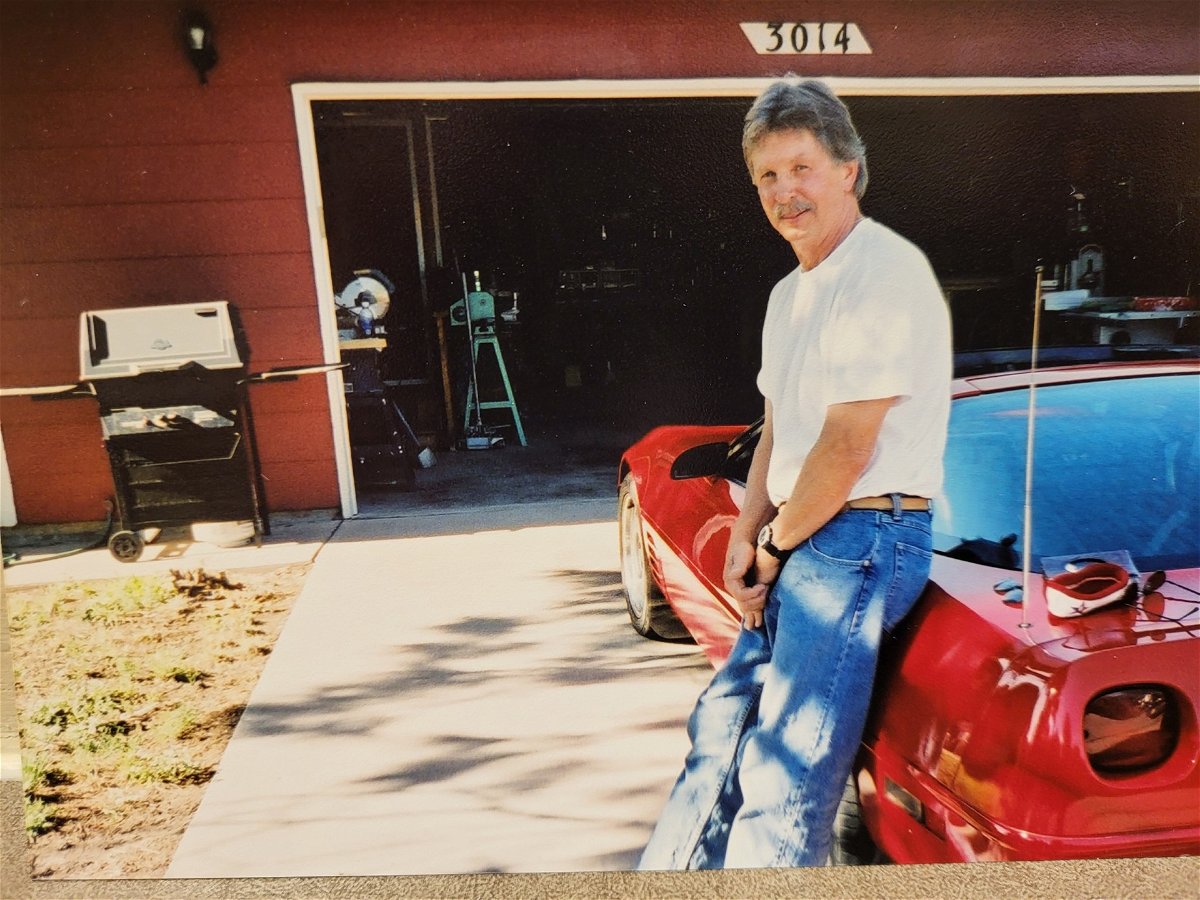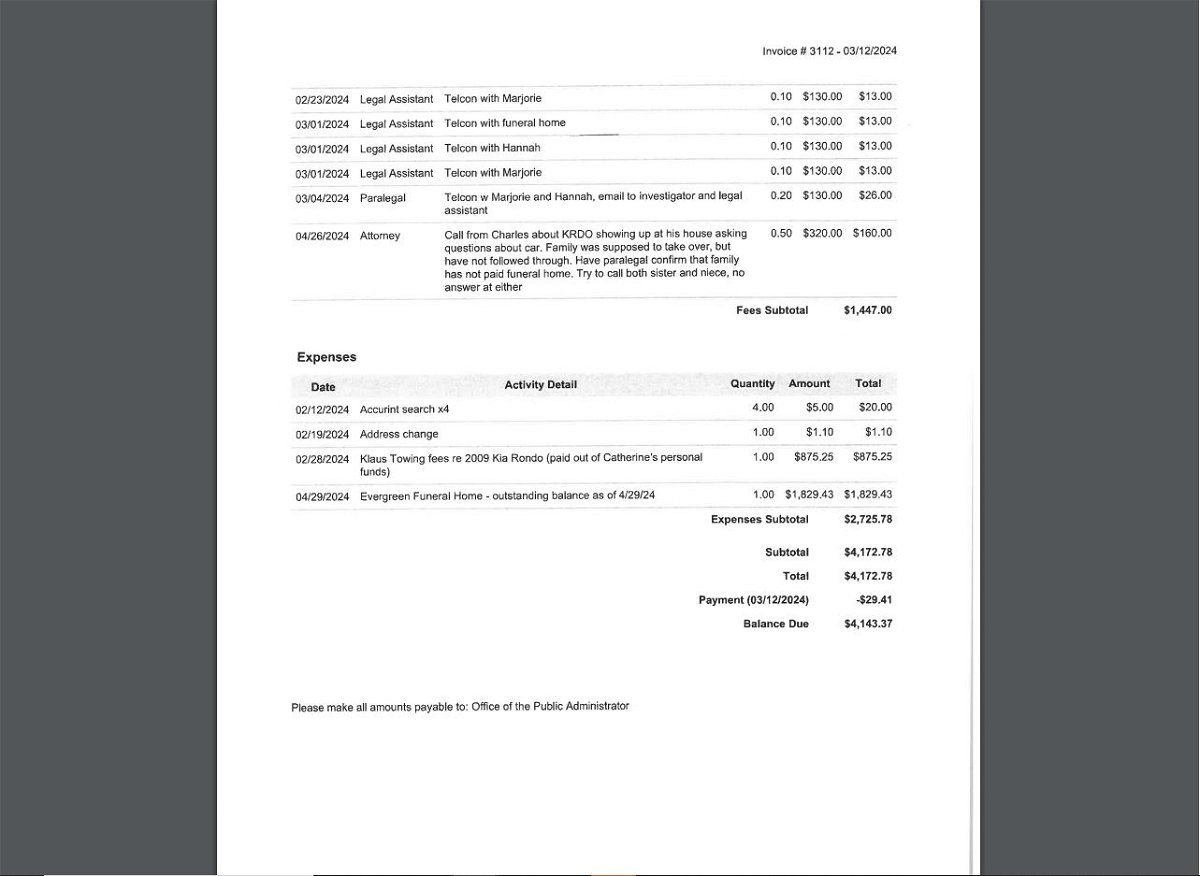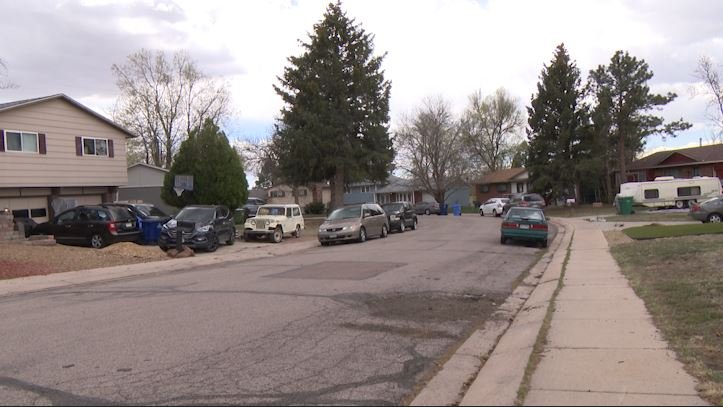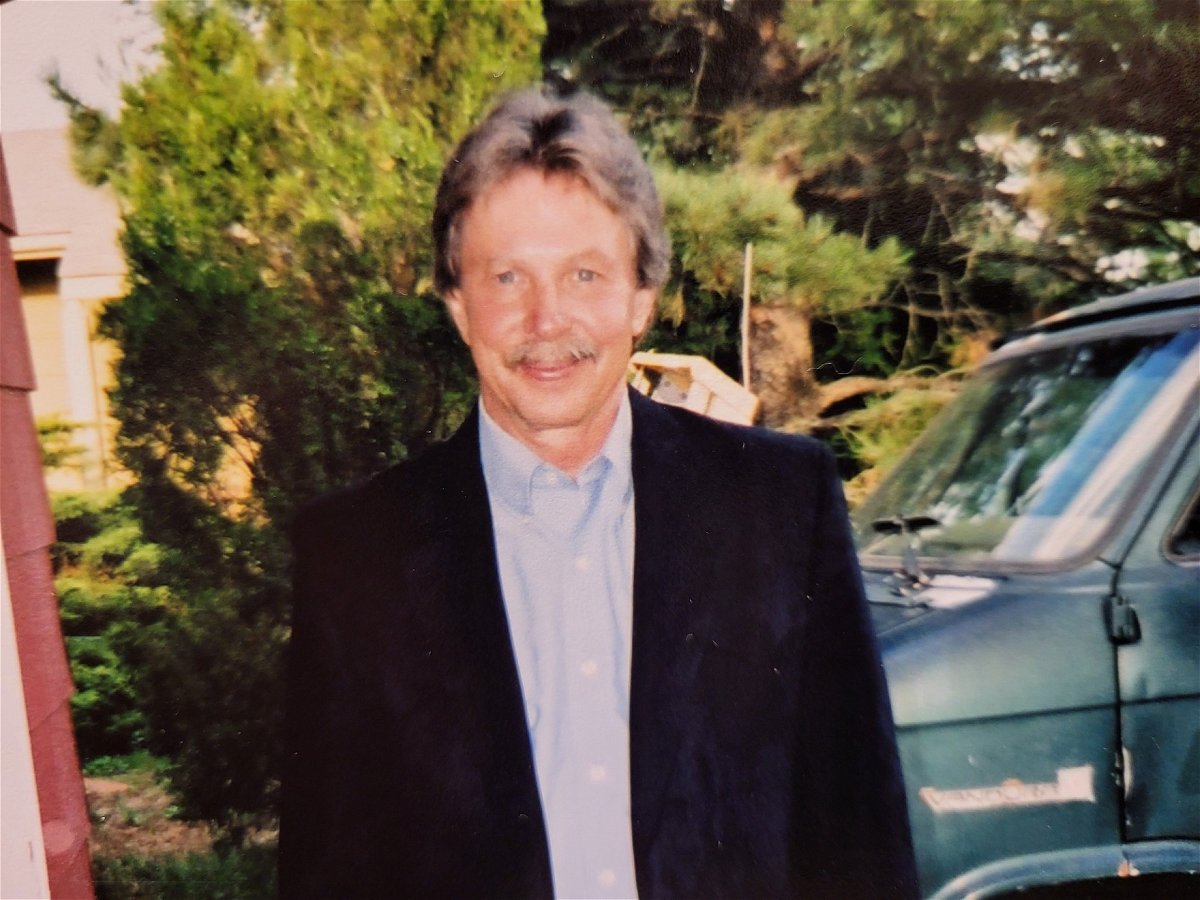KRDO13 Investigates: The Death Collector
COLORADO SPRINGS, Colo. (KRDO) - It's been nearly five months since Frank Durbin died. A growing bill awaits his family to lay him to rest properly.
$4,143.37.
That's how much 4th Judicial District Public Administrator, attorney Catherine Seal, has billed the family of Frank Durbin to settle his estate.
The 77-year-old's bank account, 2009 Kia Rondo, personal belongings, death certificate, and human remains are now under the control of the Public Administrator, who assumed responsibility after Frank passed away January 22, 2024, in his car of natural causes in a grocery store parking lot.

One month after his death, February 22, Frank's family received a letter from Seal, informing them of his passing. By then, however, Catherine Seal's office had already sent a "Release and Surrender of Leased Premises" to Frank's apartment complex, allowing employees from the Public Administrator's Office to enter and marshal his earthly belongings in order to pay for any monies due.
In hopes of achieving closure, Frank's family held a memorial service for him in mid-April, but even that was incomplete.
"We had no cremains, no body," said Hannah Cooke, Frank's great-niece. "To this day, I don't know that he's been cremated. I know nothing. She (Catherine Seal) is claiming these people have no money, so she gets to keep all of their assets."
Frank's Family Charged
Initially, Frank's family was billed $1,460.94 for cremation, which Hannah said she was willing to pay. More than one month later, however, those charges ballooned to $4,143.37.

On the itemized bill, are multiple charges tied to Frank's vehicle, including a phone call between a Public Administrator Investigator and Catherine Seal, regarding KRDO13 filming Frank's 2009 Kia Rondo parked at the investigator's personal property: "Phone call from Charles about KRDO showing up at his house asking questions about car," titled the $160 charge.
Frank's Kia, and multiple other vehicles -- some with flat tires, some with personal effects packed inside -- were indeed, parked at the Colorado Springs property. According to Cooke, Frank's Kia was fully paid off.
A KRDO13 photographer was on the public street, filming the parked cars, when someone inside the house inquired about his presence.

Adding to the family's frustration: Medicaid pays up to $1,500 for cremations through the state's (Burial Assistance Program) -- an amount that would have more than covered Frank's cremation. In the most recent bill, however, Evergreen Cemetery charged the family $1,829.43.
Additionally, according to El Paso County, since 2023, the county has paid for 39 indigent cremations through contracts with Evergreen and Angelis Funeral Homes, a funding guarantee if Medicaid doesn't pay. Prior to 2023, the Public Administrator was able to get funeral homes to donate services. That donation service is no longer offered by local funeral homes.
According to Evergreen Cemetery, 8 grave spaces and 372 inurnments are assigned to the Office of the Public Administrator.
Role and Function of the Public Administrator
In 2022, the most recent data available from the El Paso County Coroner's Office, 59 unclaimed remains -- and their estates -- were released to the Public Administrator. The coroner's office tells KRDO13, that once a positive identification is made, personnel do a quick search for next of kin. The case is turned over to the Public Administrator if none are found readily.
Catherine Seal was appointed by a probate district court judge in 2004 to be the Public Administrator of the 4th Judicial District, which serves El Paso and Teller Counties. The Public Administrator -- for which there are 29 in Colorado, including deputies -- serves as the point of contact for those who've died as indigents, those who have no known family, or those whose family cannot afford burial or cremation.
There is no term limit to the appointed office.
The position came under scrutiny in the 2017 Performance Audit, the most recent, from the Colorado Office of the State Auditor. The audit found that "Public Administrators do not always provide the courts with sufficient information to determine the reasonableness of fees and costs, which are paid out of the estates they administer." The judicial branch was also blamed for not having adequate resources to oversee the position.
Per the state's audit, "Public Administrators are paid for their services from the estates they administer as a personal representative for deceased individuals or from the accounts of protected persons they oversee as a conservator; they are not paid with public funds."
The report did not cite any specific cases of mismanagement.
Oversight
As for oversight from the judicial branch?
The 4th Judicial District probate staff collects and evaluates information returned in the Public Administrator's annual report. That information is then cross-referenced with internal file reviews, which are then turned over to the probate presiding judge for review -- who then meets with the Public Administrator during an annual meeting, and on an "as-needed basis," according to Court Executive, Scott Sosebee. "In the overwhelming number of files reviewed, a person has died without any discernible next of kin or a Will. In those cases, no one has the authority to do anything with respect to that person’s estate. No funeral arrangements can be made. No assets can be collected, preserved, or transferred. The purpose of the Public Administrator is to have someone who can do the things that need to be done when someone passes away when no one else is available to act on the decedent’s behalf."
Sosebee wrote that the Public Administrator position is not typically a hands-on process unless a case or matter requires their attention.
As for Frank's family, as of the time of this publication, they still don't know if he has been buried or cremated. Hannah says she stopped responding to calls or emails from the Public Administrator's Office, for fear that her family will be billed even more.
Evergreen Funeral Home did not respond to KRDO13's inquiry about the status of Frank's remains. Evergreen Cemetery -- a separate, city-run entity -- says they have no record on file of a person with that name.
Catherine Seal Responds
Catherine Seal initially said she is required to "maintain confidentiality regarding decedent's estates," and agreed to an interview about the function of her position. She then stopped responding to multiple contacts from KRDO13 Investigates beginning May 10, via email and phone about scheduling said interview. Seal provided documentation of the billing charges to Frank's family, but when KRDO13 Investigates asked for more records, she responded with, "Any person appointed as a public administrator shall not be considered an employee of either the state of Colorado or of the judicial district or of the city and county in which such person has been appointed as public administrator because of his or her appointment as public administrator."
Seal, a little more than 48 hours before publication, responded to additional questions from KRDO13 Investigates about the estate of Frank Durbin. She stated that Colorado law precludes Public Administrators from responding about specific cases, which is true, and also wrote that "the Attorney General is free to proceed as he believes is best."
Additionally, Seal directed questions about the Public Administrator position to the directives from the court.
June 18, Seal wrote that "her offer still stands" to be interviewed about her Public Administrator position.
Flanked by her personal counsel, Jack Roth, Seal said "what I'm not supposed to do is attract media attention. I'm just supposed to do my job." In her 20 years in the position, Seal said she had "seen a lot of things," but it's made her value "family connection and understand the importance of ritual and memory."
Asked if the family of Frank Durbin could get his remains, Roth initially answered by saying, "Okay, we're not going to answer that question." Seal, however did respond:
"I can tell you that any family that provides the next of kin can have the cremains," Seal answered.
Pressed further about returning Frank's remains, Roth responded first: "We're not going to answer a specific case."
"I can tell you that any case that I have, the last thing I want to do is hold the cremains of someone that I don't know, is not someone important to me," said Seal.
According to Seal, her public administrator office handled 283 cases in 2023, which was higher than previous years, due to the area bringing in a more transient population.
"I'm an unfunded office. So I receive no funds from the state, no funds from the county. I am paid from the case, which means that the case has no funds. I do my work and I'm not compensated. So and if I paid any fees out, I don't receive compensation for those fees."
Seal could not state how much she makes administering the estates of decedents last year, or any year, only that it is "very little."
"I don't have a number. I would have to go back and look through all my cases. There's a difference between the fees that my office receives and what I receive net of the fees. And I haven't done that accounting to tell you."
The full interview with Catherine Seal can be watched below.
Meanwhile, Frank Durbin's family is left a nomad, and debtor, in their loss.
"She is claiming these people have no money, so she gets to keep all of their assets," said Cooke. "They prey on people that are under stress and under duress. I want to be able to lay him to rest. I want to be able to scatter his ashes in the mountains, or take them with me when we go to the beach, and give him what every person deserves."

If you have a story you want our team to investigate, email us at 13Investigates@krdo.com
